Khaled al-Jeratli | Hani Karazi
Israeli maneuvers in Syrian territory have become a daily occurrence since the fall of the Assad regime on December 8, 2024, under various pretexts. Israel began to infiltrate and destroy the military arsenal of the ousted regime, claiming that it feared these weapons would fall into the hands of extremists, as Israel has stated.
As time passed, what was happening in Syria remained ambiguous for decision-making centers in Israel, and justifications for intervention were limited to destroying weapons and confiscating others used by the regime in the demilitarized zone near Quneitra province.
In February, Israel’s justifications for intervention in Syria took a more antagonistic turn. On February 25, the Israeli Ministry of Foreign Affairs stated that the new Syrian government is “an Islamic jihadist terrorist group from Idlib that seized Damascus by force,” expressing its readiness to protect religious minorities in the country.
Israel’s concerns gradually shifted to focus on the increasing Turkish influence in the Syrian arena, which observers considered an escalation that could last for an extended period.
While the pace of Israeli movements continues to escalate, it seems that the Syrian authorities have little to offer in order to stop the actions of the Israeli army, as the intensity of strikes increases across various provinces.
Israel’s fears were exacerbated by the anticipated Turkish deployment of military bases within Syria, pursuant to agreements with the new authorities.
Enab Baladi discusses in this report the justifications for Israeli movements in Syria, the impact of the proximity of the new Syrian government to Turkey on this escalation, and its consideration as a rationale for Israeli actions in Syria, as well as the Syrian options amid a polarization between the north and south, in which the Syrian interest is suspended.
Turkish-Israeli rivalry
Turkey plans to establish multiple military bases, taking advantage of the infrastructure of Syrian airports in the Palmyra area, where the Palmyra and T4 airports are located, according to media reports, which the Turkish government has not confirmed.
The Israeli Alma research center published a report on March 25, which stated that recurring information has emerged from Syria regarding aerial incidents involving clashes between Israeli and Turkish air force planes. The report noted that although these incidents have not been confirmed by either side, they could be considered “additional evidence of the threat that Turkey poses to Israel.”
Adding that, similar to the time when there was a significant Russian presence in Syria, the Turks could take a variety of retaliatory measures alongside sending their planes against Israeli aircraft. These measures may include providing the Syrians with intelligence information about Israeli intentions in advance, disseminating details about Israeli activities, and transferring advanced conventional weapons to the Syrians (focusing on air defense systems, missiles, drones, and more).
The center believes that Israel will know how to operate militarily in Syria as necessary, even in the presence of Turkish forces, as it did during the Russian presence. This may require Israel to exert greater intelligence efforts to avoid clashes with Turkish forces and to improve risk management and preparation for potential Turkish responses.
It has not been ruled out that the shared security interests of both parties may outweigh significant political tensions, and a military coordination mechanism similar to that established with Russian forces present in Syria could emerge.
According to an Israeli newspaper, The Jerusalem Post, citing an unnamed security source on March 31, establishing a Turkish airbase in Syria would undermine Israel’s operational freedom, deeming it a “potential threat.”
In recent weeks, the Israeli political and security leadership has held several discussions concerning fears of deepening Turkish intervention in Syria.
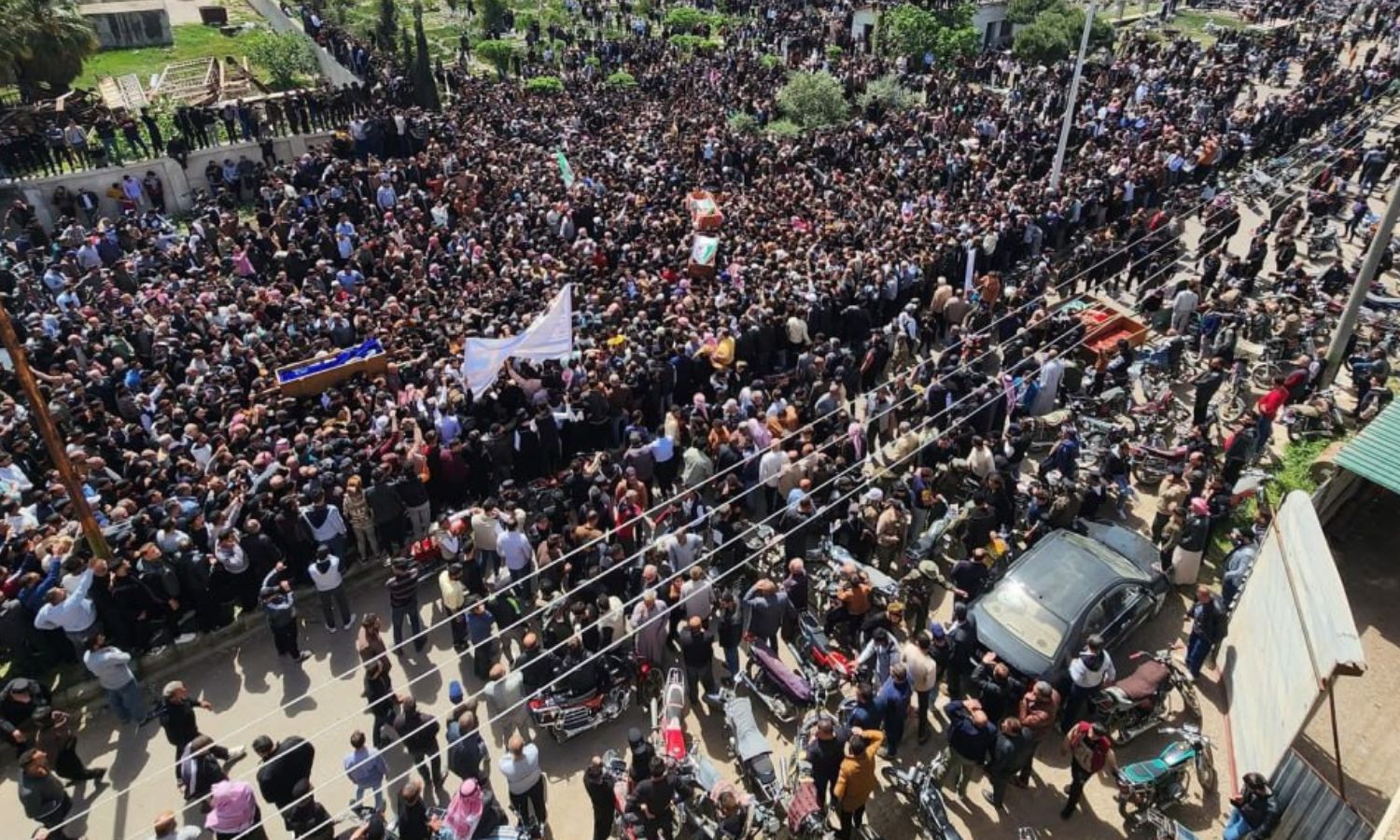
Thousands mourn the victims of Israeli shelling in the city of Nawa, Daraa – April 3, 2025 (Mohammad al-Daher/Facebook)
Turkish influence provokes Israel
The Syrian geography has not only served as a medium for Israeli messages to Turkey; Ankara has played this role as well, according to Syrian journalist Majed Abdul Nour, who stated that Turkey sends messages indicating its intention to build strong influence in Syria, as a test of the Israeli position. However, repeated Turkish statements such as those regarding delimiting borders with Syria and visits of its officials to Syria provoke Tel Aviv.
Abdul Nour told Enab Baladi that for Israel, Turkey is like Iran; it will not replace Shia political Islam with Sunni political Islam, so Tel Aviv will not allow Ankara to expand and strengthen its influence further in Syria. This means that Israel will continue its escalation in Syria as long as there is a Turkish intention to increase its influence in the region, with the Syrians paying the price.
Turkish Foreign Minister Hakan Fidan stated to Reuters that Turkey does not want a confrontation with Israel in Syria, adding, “If Damascus wants to reach certain understandings with Israel, that is its concern.”
For his part, political analyst Ahmed Atawna, director of the Vision for Political Development Center, sees the Turkish influence in Syria, which poses a concern for Israel, as the most delicate point in the current scene, especially since neither Israel nor Turkey desires direct confrontation. Israel also realizes that Turkey is a large and powerful country and is a NATO member, making a confrontation with it not easy at all.
Atawna stated to Enab Baladi that Israel is trying to draw limits on the level of Turkish presence in Syria from its perspective, thus trying to send a message to Ankara that it will not allow it to control the entirety of Syrian territory or to have influence throughout Syria.
The political analyst also pointed out that Turkey is insistent on its steps in Syria, therefore Israel’s strategy against it will not succeed. He noted that Ankara views its deployment in Syria as part of its national security and is also adamant about the idea of a unified Syria under central rule. This is a strategically important demand for Turkey, as any division in Syria will undoubtedly affect Turkey.
Atawna also mentioned that the regional and international position could support Turkey in imposing stability in Syria. Therefore, it may be that Israel is playing a losing game or is in the final moments, and it will not be able to impose its will in Syria.
Border conflict
The military operations of the “Deterrence of Aggression” operations room led to the fall of the Assad regime at the end of 2024, but the results were not limited to that; rather, they also led to the termination of Iranian influence in Syria, opening the Syrian arena to a new era and new alliances.
Since the regime’s fall, many embassies have reopened in Damascus after nearly 13 years of absence, with the most notable being Turkey and Qatar.
After the defeat of the Iranian project inside Syria and the country opening to a new era, there has been clear support from the Turkish-Gulf axis for the Damascus interim government, alongside a degree of Turkish influence in northern Syria, based on Turkish concerns about the establishment of a Kurdish state on its southern border, as perceived by political researcher Jamal al-Shoufi.
The researcher linked Turkey’s desire to expand its influence inside Syria to border concerns, considering that northern Syria threatens Turkey with the establishment of a Kurdish state that could extend into its territory if it does not act against it. He pointed out that Israel is also acting based on the same concern.
Al-Shoufi told Enab Baladi that there is polarization between the north and south led by Turkey and Israel.
He pointed out that Turkish concerns remain clear today, particularly as the security situation in Syria has not yet stabilized. However, in the south, Israel seeks to capitalize on the weakness of the nascent Syrian state at this time. Based on this desire, it announced the termination of the “disengagement agreement” signed in 1974 and penetrated into some villages in Quneitra, attempting to redraw the borders again with a new international treaty.
Al-Shoufi considered that Israel seeks to capitalize on the issue of religious minorities, noting that this is a bad investment that undermines efforts for stability.
The researcher added to Enab Baladi that, on the other hand, there are other issues related to Turkey and the delimitation of its borders, but the important point is Syria’s necessity to adhere to its Arab depth, which is the clearest and best for staying away from the risk of Israeli investment in the Syrian interior, especially since Israel only seeks to redraw its borders through a new international treaty, ruling out that Israel is looking for a ground invasion but seeks technical and material hegemony over neighboring countries.
Turkey’s fears in northern Syria mainly stem from the potential establishment of a Kurdish state along its borders, which is part of the polarization between the north and south, while Israel looks to the south to invest in the weakness of the newly emerging Syrian state at present and has announced due to this intention the termination of the 1974 agreement in some villages in Quneitra, aiming to attempt to redraw the borders again with a new international treaty.
Jamal al-Shoufi, Political researcher
Other messages… Keeping Syria weak
Turkey was not Israel’s primary excuse in Syria, as it invaded southern Syria searching for military equipment and announced the confiscation of several items. It then struck military sites that it claimed contained weapons depots of the former regime, along with other airstrikes that it said targeted groups linked to Palestinian factions.
The reliance on the Turkish presence in Syria has recently surfaced after talk of Turkey signing military agreements with Syria, despite Turkey stating that it is not seeking confrontation with Israel in Syria.
Ahmed Atawna, director of the Vision for Political Development Center, believes that Israel is pursuing the same policy it has long adopted toward all countries that could significantly influence the region, which could upset the balance of power.
Atawna told Enab Baladi that Israel understands the geostrategic value of Syria, its history, and its position on the Palestinian issue and the Arab-Israeli conflict. Therefore, it continues to create chaos and maintain military and security pressure on Syria, considering it a pivotal and central state in the region.
He added that after the significant change that occurred in Syria and the fall of the regime, Israel views the new rule in Syria with suspicion, considering it an Islamic government with ideological and principled positions toward Israel and the Palestinian-Israeli conflict. As a result, Israel is neither reassured nor does it wish for a unified Syria under this regime to stabilize.
Today, Israel believes it is in a phase of rebuilding military balance or deterrence at the regional level, in Lebanon, Syria, Palestine, Iraq, and all the countries in the area, according to Atawna. Therefore, it believes its actions enhance its deterrence policy in the region.
The political analyst pointed to Israel’s fears of growing Turkish influence in Syria, noting that Israel sees it as a “Sunni influence” paving the way for the reestablishment of significant Sunni power in the region, which poses a danger to its existence.
Israel is very concerned about the Turkish influence and what it perceives as Sunni influence in Syria, and thus the reestablishment of a large Sunni force in the region is a threat to its existence.
Dr. Ahmed Atawna, Director of the Vision for Political Development Center and political analyst
Atawna told Enab Baladi that Israel’s aim behind its harsh military escalation in Syria is to pressure against allowing a unified Syria, hoping to contribute to its division based on different minorities, ethnicities, and nationalities, a fact it openly addresses through its discussions of Syrian Druze, Kurds, and Alawites.
Other messages behind the escalation
Nawar Shaaban, a researcher at the Harmoon Center for Contemporary Studies, believes that the Israeli escalation in Syria is not aimed at targeting security sites belonging to the ousted regime as it claims, but rather to convey indirect messages, undermine the military capability of the Syrian state, and create an environment that ensures instability, coinciding with its maneuvers with minorities and trying to win over the Druze in the south to its side.
Shaaban told Enab Baladi that the increase in escalation is also due to the change in the regime that used to deal with Israel. During Assad’s rule, there was a security threat to Tel Aviv from Iran, and Israel managed this threat security-wise by periodically targeting suspicious Iranian movements within Syria.
Israel was able to maintain security stability in Syria under the previous Assad regime, according to Shaaban, either through unannounced balances and agreements with the Russians or through the leaking of intelligence from Assad’s regime to Israel about Iranian sites in Syria. However, the change in governance in Syria has led to a new independent government attempting to build its sovereignty, according to Shaaban.
The researcher pointed out that Israel’s previous tools have changed, along with the new allies of the Syrian government, including Turkey, whose threat to Israel is not merely security but structural and strategic, thus posing a huge risk to Israel’s strategy post-October 7, 2023. These factors all explain the reason behind the Israeli escalation in Syria, according to Nawar Shaaban.
Israel’s previous tools have changed, along with the new allies of the Syrian government, including Turkey, whose threat to Israel is not merely security but structural and strategic, thus posing a huge risk to Israel’s strategy post-October 7, 2023. These factors all explain the reason behind the Israeli escalation in Syria.
Nawar Shaaban, Researcher at the Harmoon Center for Contemporary Studies
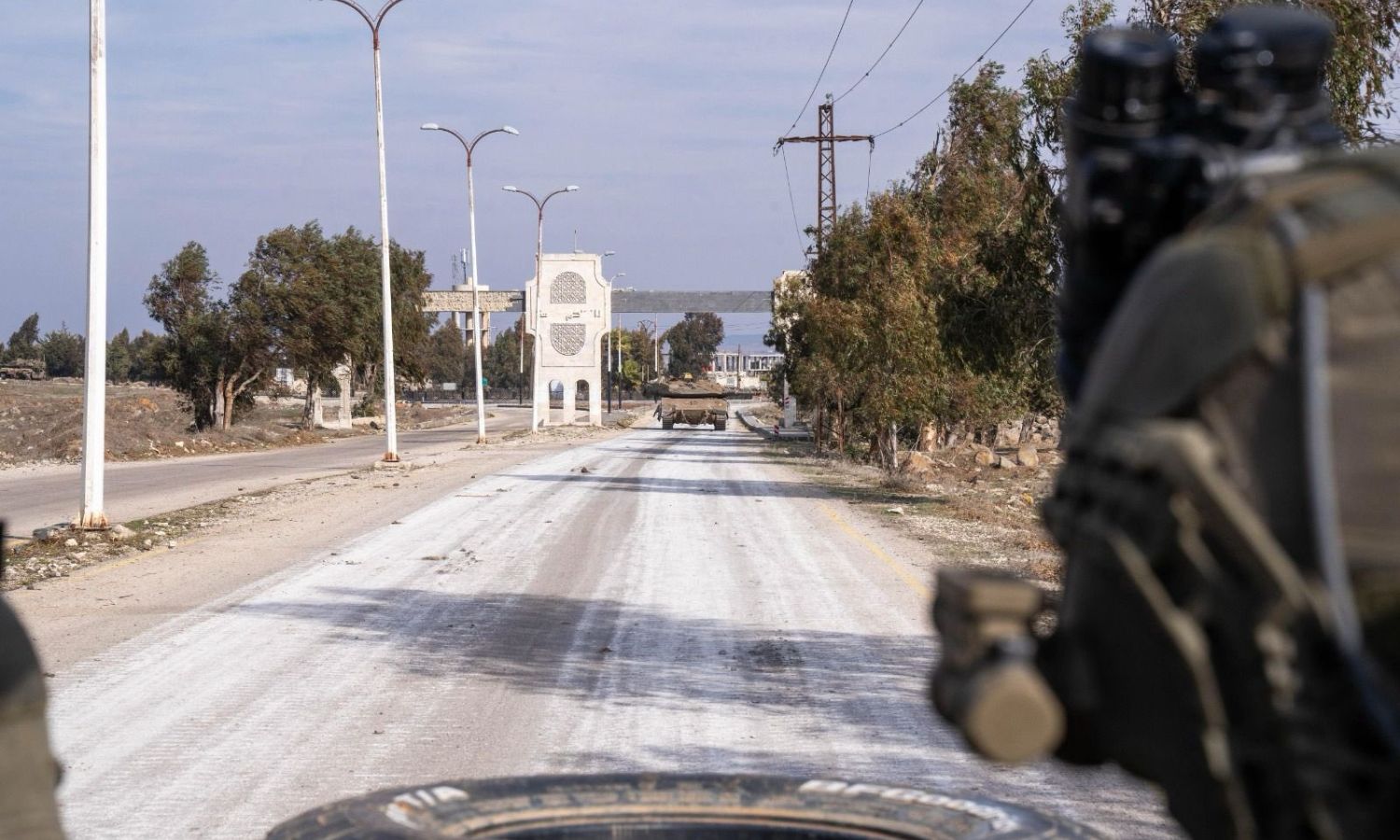
Entry of Israeli forces into the buffer zone on the Syrian border with the occupied Golan Heights – December 9, 2024 (Avichay Adraee/X)
US approval and support
On February 28, Reuters reported that Israel is exerting pressure on the United States to keep Syria “weak and decentralized,” while allowing Russia to maintain its military bases on the Syrian coast to counter the growing Turkish influence in Syria.
While the United States has not shown any reaction to Israel’s behavior in Syria, US officials expect relationships to form between Israel and Damascus, without indicating how to achieve this.
Nader al-Khalil, a researcher specializing in political affairs, believes that Israel relies during its movements in Syria on US support at both the political and military levels, which grants it more freedom of movement within Syria.
Al-Khalil told Enab Baladi that the weakness of the Syrian state is one of the cornerstones of Israel’s behavior inside Syrian territories, as it exploits the weakness Syria has suffered since the outbreak of the Syrian revolution in 2011, allowing it to carry out airstrikes and target sites it considers a threat, to prevent the presence or establishment of any military bases and equipment that could pose a future threat to its dominance.
Israel also attempts to portray itself as a protector of some religious minorities in Syria, such as the Druze, and publicly expresses this as a justification for intervening in certain Syrian areas.
For his part, researcher at the Omran Center for Strategic Studies, Maan Talaa, considered that Israel relies on internal directives formulated after the al-Aqsa Flood operation in October 2023, being the “necessity of not having opposing forces within its vital surroundings.”
Talaa told Enab Baladi that this strategy includes Lebanon and southern Syria, aimed at preventing any new forces from even having the technical capacity to establish a defense system, not just an offensive one, thereby attempting to keep this regime weak, unable to respond. Israel views what it was subjected to in 2023 as a strategic security breach not experienced since 2008, hence it requires a new deterrent mechanism.
He pointed out that the majority of US officials in the Trump administration agree on the necessity of supporting Israel and also on the importance of not favoring political Islam. Therefore, today, it is trying to leverage the opportunity of lost time to establish new rules for engaging with this scenario.
Limited options for Syria
The Syrian Foreign Ministry has issued several statements condemning the Israeli attacks on Syria.
Following the Israeli bombing of Hama Airport and other sites, the Syrian Foreign Ministry stated that this unjustified escalation is a deliberate attempt to destabilize Syria, prolong the suffering of its people, undermine recovery efforts, and entrench a policy of impunity.
Amid continued Israeli escalation after the fall of the regime, strategic expert and non-resident researcher at the Stimson Center in Washington, Amer al-Sabaileh, noted that the options for the Syrian government are very limited, as this government is still in the rehabilitation phase and faces challenges in making internal decisions, as well as in building foreign relations and gaining international recognition.
Al-Sabaileh added, “In regard to the current situation, I believe Damascus does not have the capacity for military confrontation with Tel Aviv, meaning a conventional war, nor does it have the ability for diplomatic maneuvering on the international stage.”
The choices for the Syrian government are extremely limited; it is still in the rehabilitation phase and faces challenges in decision-making internally and in building foreign relations and seeking international recognition.
Amer al-Sabaileh, Strategic expert and non-resident researcher at the Stimson Center in Washington
In light of this reality, al-Sabaileh believes the Syrian government has no choice but to attempt to reach an understanding with the US administration, which will be worked on during Ahmed al-Sharaa’s visit to Saudi Arabia and the potential meeting with President Donald Trump. At that point, they could start discussing the reshaping of this scene.
Israeli Channel “i24” reported that President Trump will meet with President Ahmed al-Sharaa during his anticipated visit to Saudi Arabia in mid-May.
According to the channel, the upcoming meeting was arranged through personal mediation by Saudi Crown Prince Mohammed bin Salman.
Journalist Majed Abdul Nour also spoke about the Syrian government being weak and fragile, with extremely limited options for dealing with the Israeli escalation, having no choice but to engage in diplomatic efforts. He noted that Turkey must recognize that the newly-born government in Damascus does not have the political and diplomatic luxury to bear the costs of behaviors that annoy Israel.
Abdul Nour added that the United States is still hesitant to recognize the Syrian government, while the European Union does not influence Israel, despite its openness to Damascus. Thus, the Arabs are the only ones capable of influencing Israel, but so far, there is no concrete stance; those countries are limited to issuing condemnations.
Nawar Shaaban stated that the Syrian government should continuously reach out to the international community without fatigue, document violations, issue timely statements, and pay attention to the popular base affected by Israeli escalation, by providing financial aid and compensations for damages, along with moral solidarity.
As for the possibility of a military response, this is not feasible; the current government does not have the capacity to open a front against Israel, which has become more aggressive since October 2023, where it destroyed Lebanon’s Hezbollah, eliminated Hamas and Iranian Revolutionary Guard Corps leaders in Syria and Lebanon, and committed massacres in Gaza, according to Shaaban.
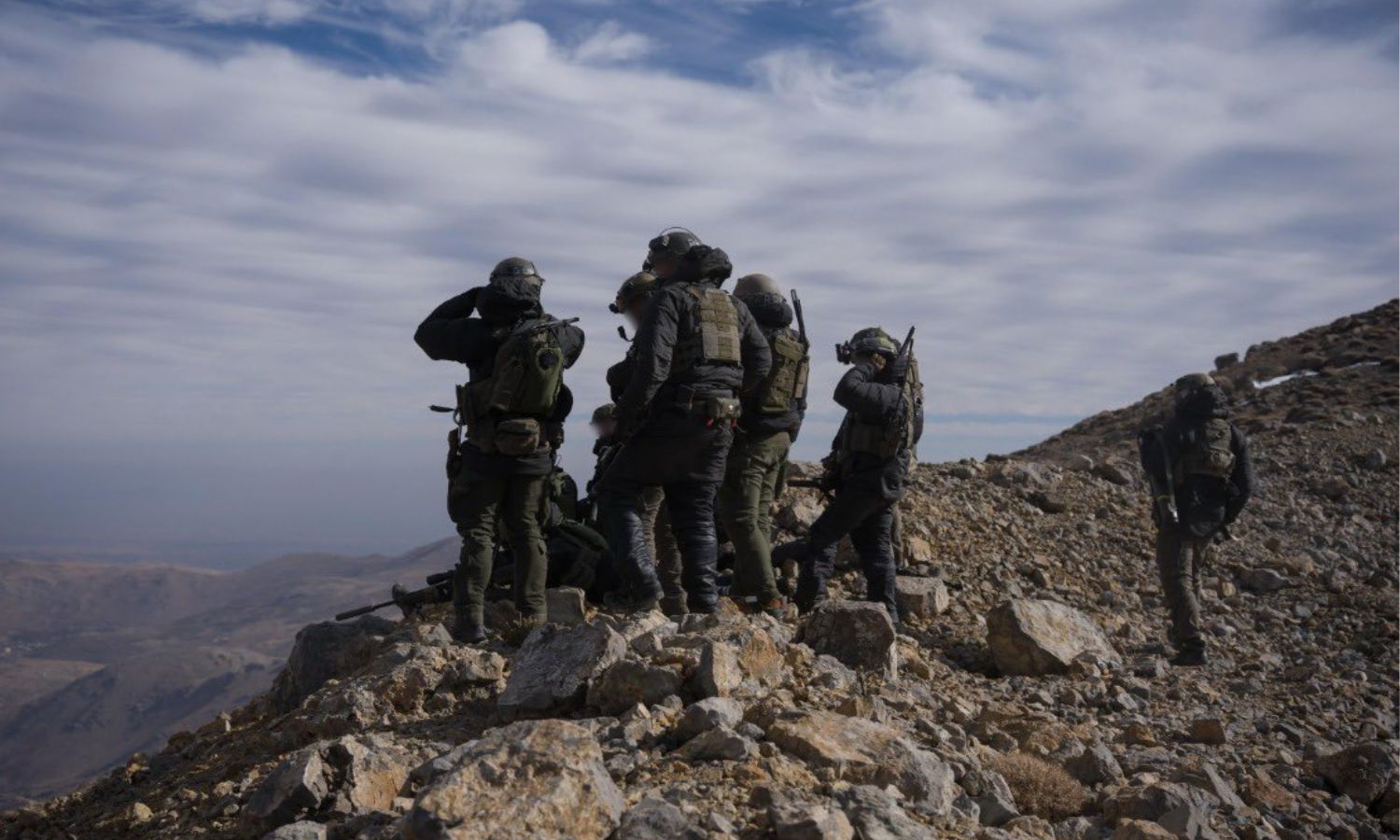
An Israeli military unit on the Syrian side of Mount Hermon in southern Syria – December 9, 2024 (Avichay Adraee/X)
Scenarios of escalation
There are multiple scenarios on the table resulting from the ongoing escalation in the Syrian arena, which observers believe are inevitable unless an event occurs that changes the course of events on the ground, especially since the international climate is conducive to escalation since the start of the Israeli war on Gaza, Lebanon, and its recent transition to an American war in Yemen.
Researcher Maan Talaa linked the events occurring to three expected scenarios. The first is related to the stagnation of the Damascus government, leading Israel to convert military points in southern Syria into strategic bases, especially after these points witnessed incursions and the destruction of some weapons storage and even defense systems.
The second scenario pertains to the diplomatic front. Talaa mentioned to Enab Baladi that Israeli movements in Syria might cease if parties reached an agreement with regional powers to establish new rules of engagement that ensure no Iranian vacuum is filled by any force opposed to Israel. Thus, there could be attempts at establishing security arrangements, which may have already begun, with indicators suggesting this, but it will require a lengthy period.
Talaa noted that the third scenario might be Israel preparing for a “civil war scenario” in Syria, leading to a loss of control over borders and other storage sites, such as strategic weapon stockpiles, especially chemical weapons or remnants thereof. Consequently, Israel may see the need to be particularly proactive regarding Syria in the foreseeable future.
Will the escalation continue?
The current regional climate is viewed as conducive for further Israeli escalation against Syria until two conditions are met: first, ensuring the geographical neutralization it desires, and second, achieving political agreements, according to researcher Amer al-Sabaileh.
Al-Sabaileh stated to Enab Baladi that as long as the region prepares for an escalation with Iran, it implies that this geography must be completely isolated from any attempts to target Tel Aviv through it, meaning that Syria will remain a hotspot for Israeli attacks in the coming period.
On the other hand, researcher Nawar Shaaban noted that Israeli targeting is no longer merely aimed at security purposes, but rather consists of attacks intended to send indirect messages, undermining any military movement that could disturb Israel.
Shaaban highlighted that the current problem lies in Israel, which targets any movements it perceives as threatening its interests. This is to curb this security threat or send a message through such targeting, thus making it difficult to predict a timeline for halting those strikes.
Researcher Nader al-Khalil noted that the Turkish-Israeli rivalry in Syria reflects a clash of strategic interests between both parties. While Turkey seeks to enhance its regional influence, Israel aims to protect its national security and ensure freedom of military operations.
He believed that direct escalation between the two parties might be costly; therefore, it is likely that the rivalry will continue in an indirect framework, with limited interventions from both sides.
It is essential to work and focus on the importance of dialogue and understanding to avoid further conflicts that the Syrian people pay the price for. The only solution to avoid detrimental escalation lies in enhancing international efforts to reach a comprehensive political settlement in Syria and regulating external interventions in a way that ensures respect for Syrian sovereignty.
Nader al-Khalil, Researcher specialized in political affairs
if you think the article contain wrong information or you have additional details Send Correction
النسخة العربية من المقال
-
Follow us :












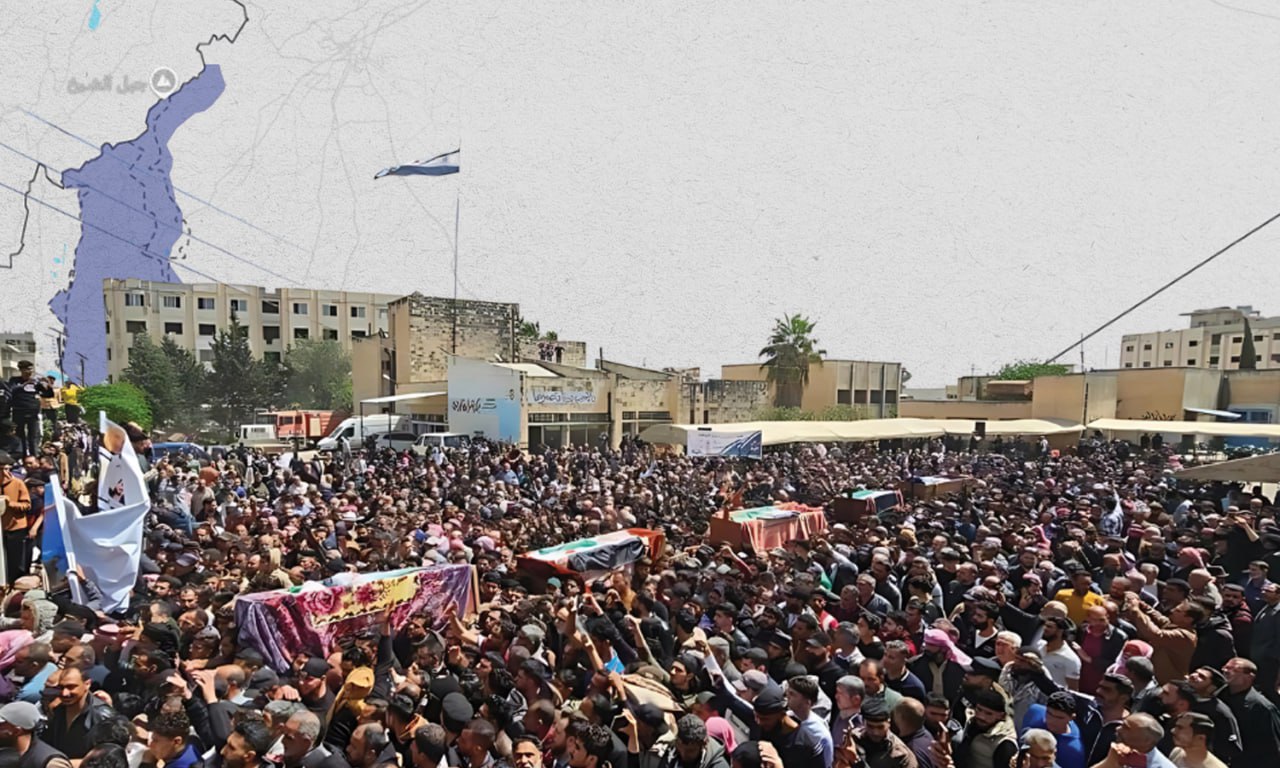
 Thousands mourn the victims of Israeli shelling in the city of Nawa, Daraa - April 3, 2025 (Mohammad al-Daher - Facebook/Modified by Enab Baladi)
Thousands mourn the victims of Israeli shelling in the city of Nawa, Daraa - April 3, 2025 (Mohammad al-Daher - Facebook/Modified by Enab Baladi)





 A
A
A
A
A
A

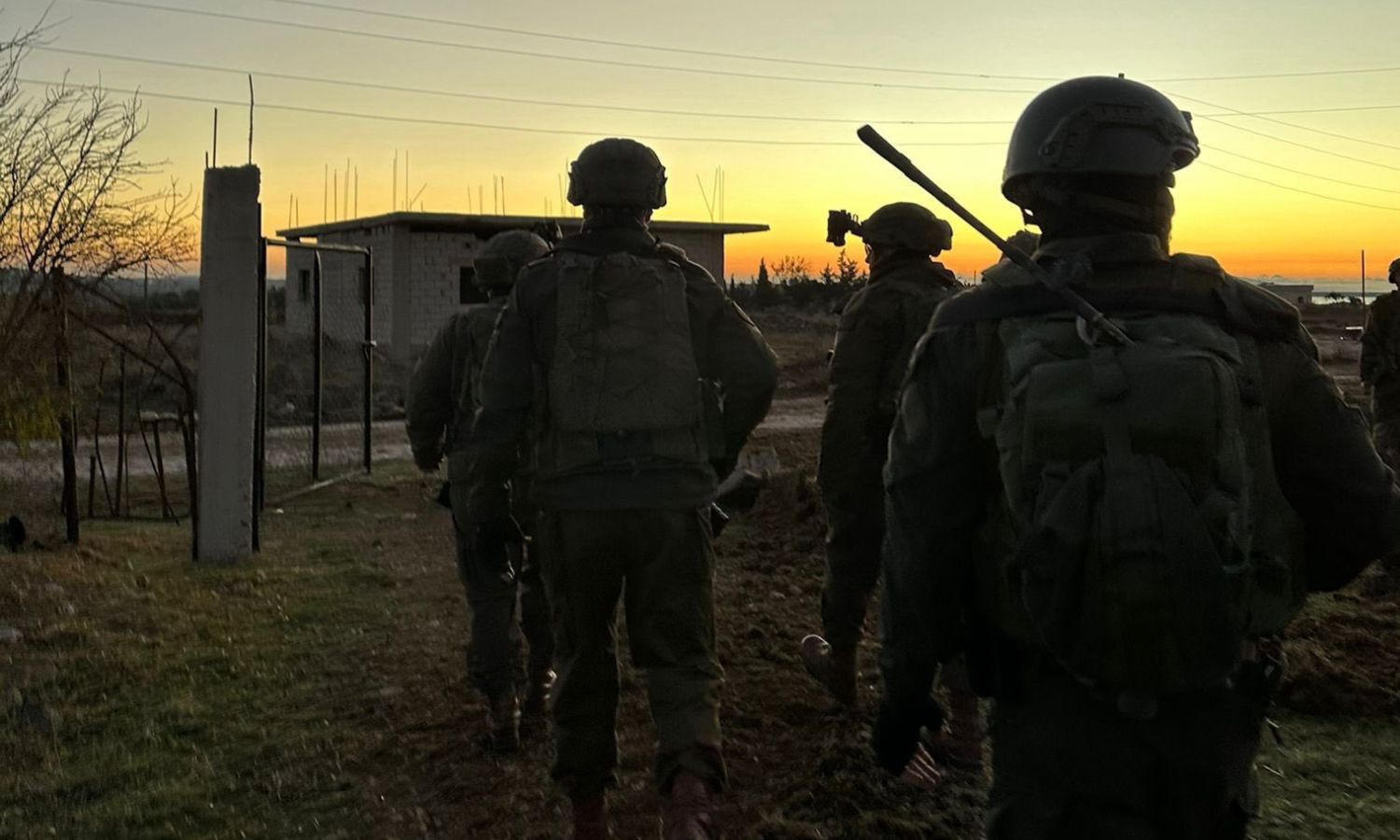







 More In-Depth
More In-Depth